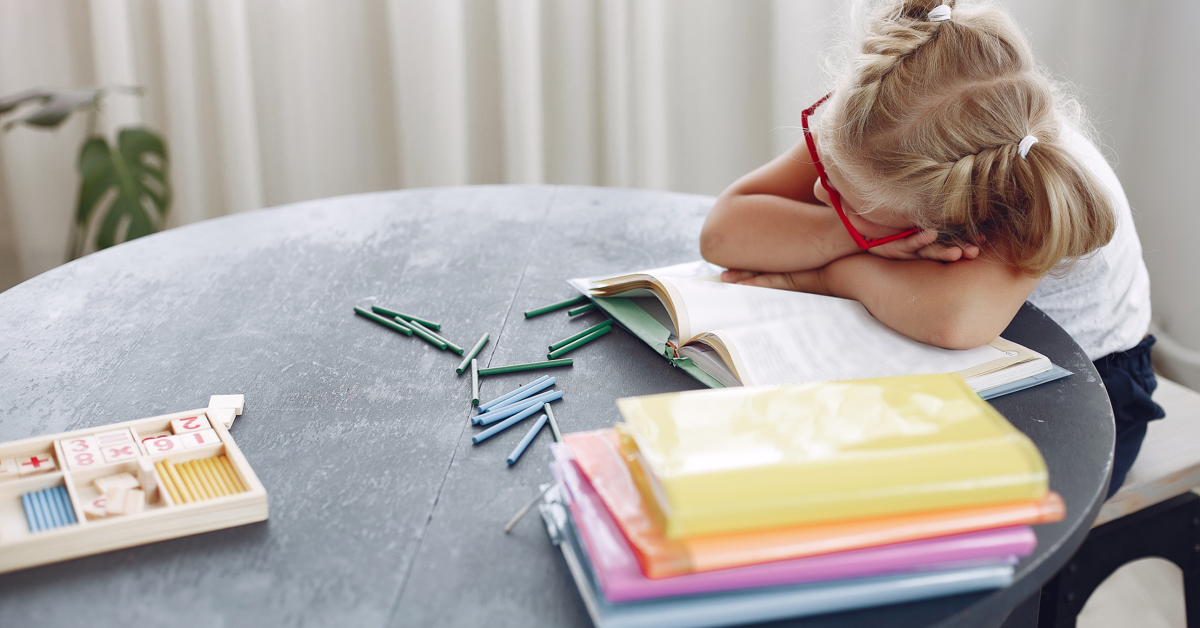Anxiety is a feeling that occurs when there is uncertainty about a situation, environment, activity.
Most people think that anxiety is about panic attacks. Panic attacks actually are just a symptom of anxiety. It is the way the body reacts to the anxiety it is feeling. Think of it as the body protecting itself.
So if your child isn’t experiencing panic attacks, do they still have anxiety? Yes! Children will demonstrate anxiety through behaviors. Children might have behaviors every time they have to do a particular thing. Think of Fridays, when I was in school, every Friday seemed like it was “test” day. There was always a spelling test or math test, sometimes both. So every Friday, for an extended period of time, I would get sick to my stomach. When I would tell my mom, I didn’t feel good; she would say, “are you throwing up or have a fever?” I would say, “no, but my tummy hurts.” She would respond, “well, go to the bathroom, and then go to school.” What my mom didn’t realize what I was experiencing was test anxiety. It only happened when I knew I was having a test or thought I had a test.
Maybe your child doesn’t want you to leave them, whether it is with a babysitter, grandparent, or even an extracurricular activity. Some call it separation anxiety; regardless, the child is still feeling uncertain when this situation happens. It is essential to realize, is there a real fear the child is feeling, or is it a behavior to get a need met? I was in NY with a client a couple of years ago, and the parents were going through a separation. Every time the mom would drop him off at day camp, he would have a meltdown. When I say meltdown, he is screaming, crying, and holding on to mom’s leg, saying, “don’t leave me, please.” What mom would that not affect? So why? What was really going on? Did he not like day camp? No, he actually loved it and would talk about going the next day, and yet this was a regular occurrence with him. Each time he would do this, mom would stay, sometimes she would stay all day. He quickly learned what he needed to do to get his mom to stay. Was this real anxiety, or was it a way to get what he wanted, mom to stay, and him to be with his friends at day camp? How do you know if its a behavior or anxiety?
A couple of things to look for:
- Is it only happening at one place the child is dropped off?
- Does the behavior continue until you get home, and they are withdrawn from their peers?
- Are there other behaviors happening such as wetting themselves, behavior outbursts, hiding in places, so they do not have to be with others until you come back, or maybe they stay by the adult the entire time.
- If its a behavior to attain what they want, the behavior will not continue, and it will be reshaped by redirection and positive reinforcement.
Children have a difficult time to communicate exactly what they are feeling. Even at a young age, our children do not want us, parents to be sad or disappointed in them. It is crucial that we are not assuming what they are feeling and not quick to give their emotion a label, such as anxiety. Instead, here are a few things you can do.
- Ask them “what” and “how” instead of “why” ex: What does it mean for mommy to leave you at school? What do you need to feel _____? If they say it means that they are scared, you would ask what they need to feel, not scared? It is vital to use their words. Younger kids may say “sad” or “scared” instead of “nervous” or “alone.”
- Give them anticipatory guidance before whatever it is that they define that makes them feel uncertain. Ex: Today is Thursday, what do you get to do on Thursdays? The child says, “gymnastics.” “Yes, and what is it you love about gymnastics?” By asking them better questions, it starts to redirect the brain to remember what is great vs. what makes them uneasy. It gives them certainty, which is the antidote to anxiety.
- Create a schedule or picture schedule. When you sit with your child and allow them to contribute to what their day looks like, it will give them a sense of worth that they are accomplishing what they created, and it will provide them with some certainty in completing it because they helped create what is expected each day. So this strategy has much more value than just assuring them; it is giving them worth too.
Remember, moms; you are doing great. It is not easy to understand what our children are feeling or going through. The more we become aware and learn different strategies, the more our children will be able to express specifically what they are feeling with you and feel safe and supported.

